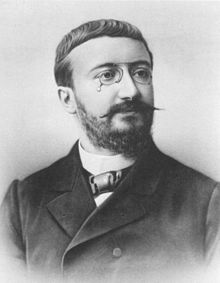Alfred Binet | |
|---|---|
 Alfred Binet | |
| Born | 8 July 1857 |
| Died | 18 October 1911 (aged 54)[1] Paris, France |
| Nationality | French |
| Known for | Stanford–Binet Intelligence Scales Binet–Simon test |
| Spouse | Laure Balbiani |
| Scientific career | |
| Fields | Psychology |
Alfred Binet (French: [binɛ]; 8 July 1857 – 18 October 1911), born Alfredo Binetti, was a French psychologist who together with Théodore Simon invented the first practical intelligence test, the Binet–Simon test.[2] In 1904,[3] Binet took part in a commission set up by the French Ministry of Education to decide whether school children with learning difficulties should be sent to a special boarding school attached to a lunatic asylum, as advocated by the French psychiatrist and politician Désiré-Magloire Bourneville, or whether they should be educated in classes attached to regular schools as advocated by the Société libre pour l'étude psychologique de l'enfant (SLEPE) of which Binet was a member. There was also debate over who should decide whether a child was capable enough for regular education.[4] Bourneville argued that a psychiatrist should do this based on a medical examination. Binet and Simon wanted this to be based on objective evidence. This was the beginning of the IQ test. A preliminary version was published in 1905. The full version was published in 1908, and slightly revised in 1911, just before Binet's death.
- ^ Alfred Binet lived approximately years which was common around this time period. "Alfred Binet". Archived from the original on 2011-08-23. Retrieved 2012-01-10., (February 20, 2004).
- ^ O. L. Zangwill, 'Binet, Alfred', in R. Gregory, The Oxford Companion to the Mind (1987) p. 88
- ^ Brysbaert, Marc (2024). "Two Persistent Myths About Binet and the Beginnings of Intelligence Tests in Psychology Textbooks". Collabra: Psychology. 10. doi:10.1525/collabra.117600.
- ^ Nicolas (2013). "Sick? Or slow? On the origins of intelligence as a psychological object". Intelligence. 41 (5): 699–711. doi:10.1016/j.intell.2013.08.006.